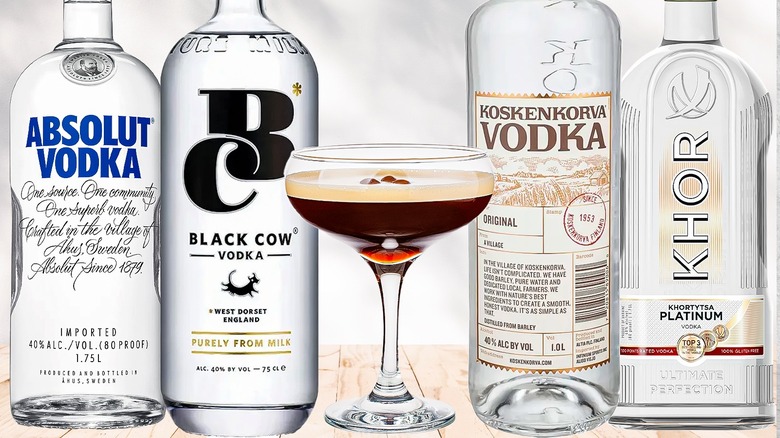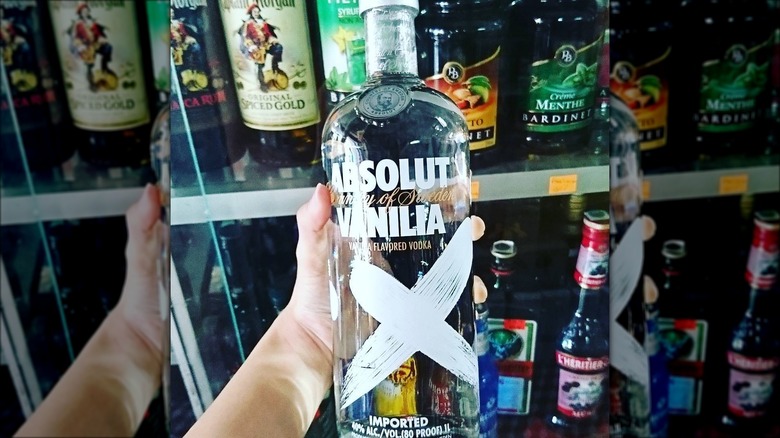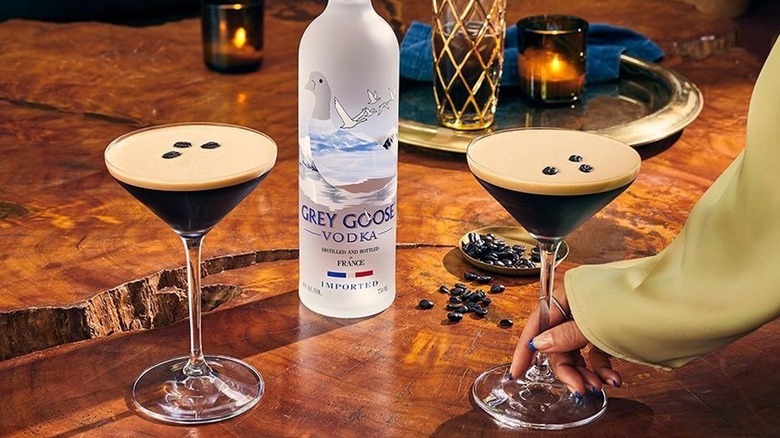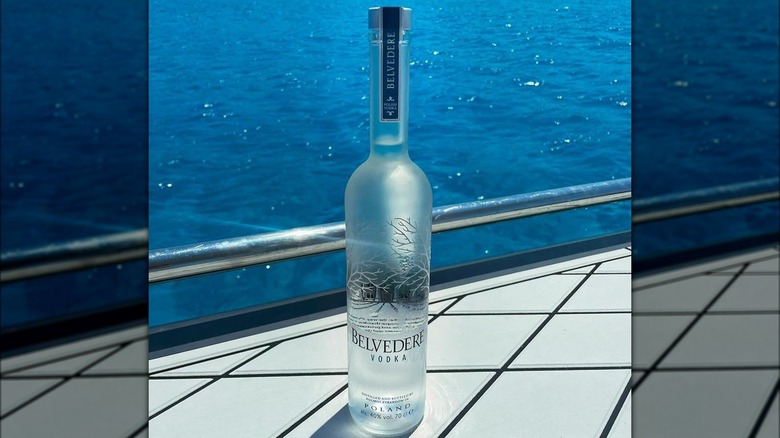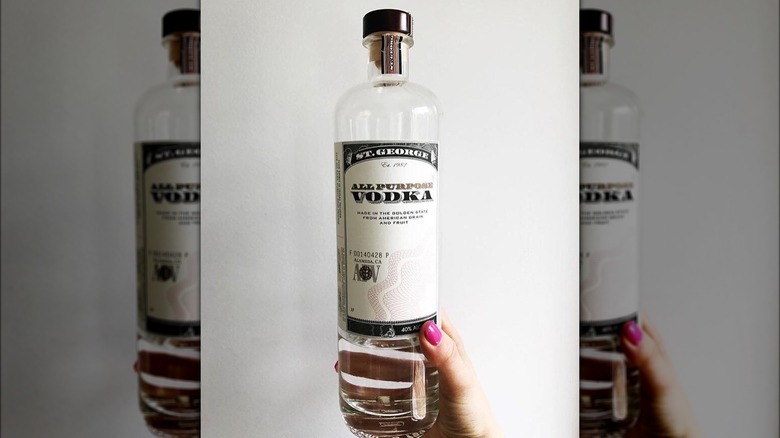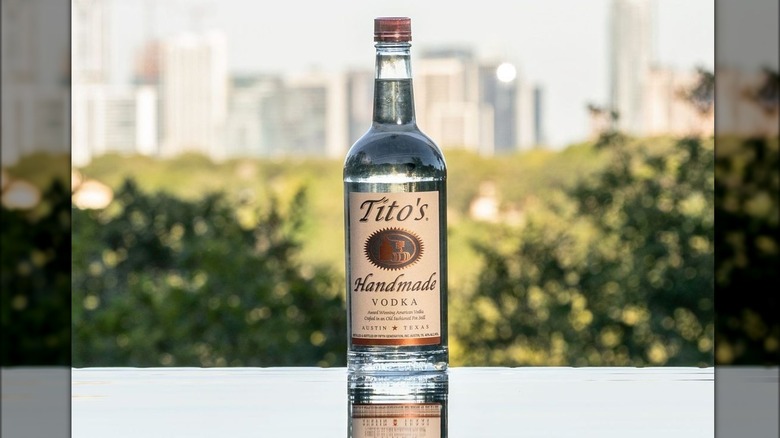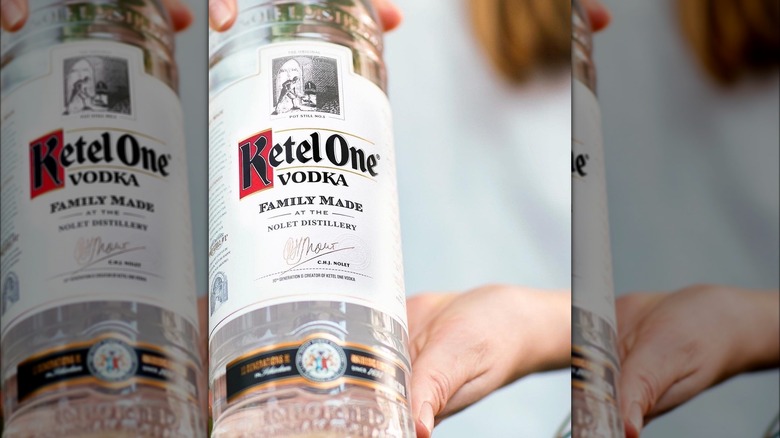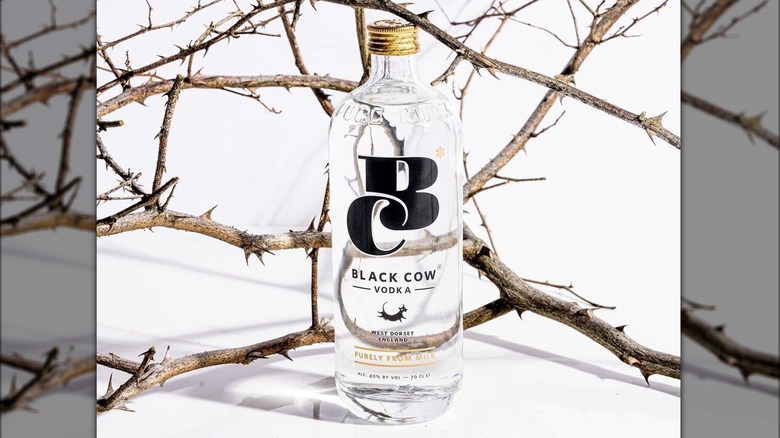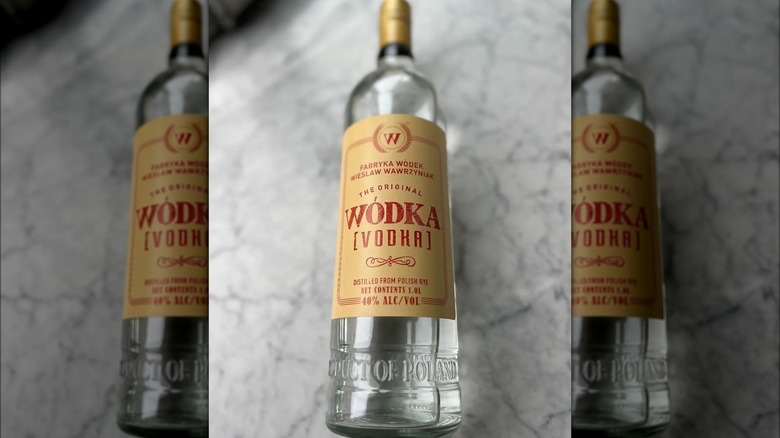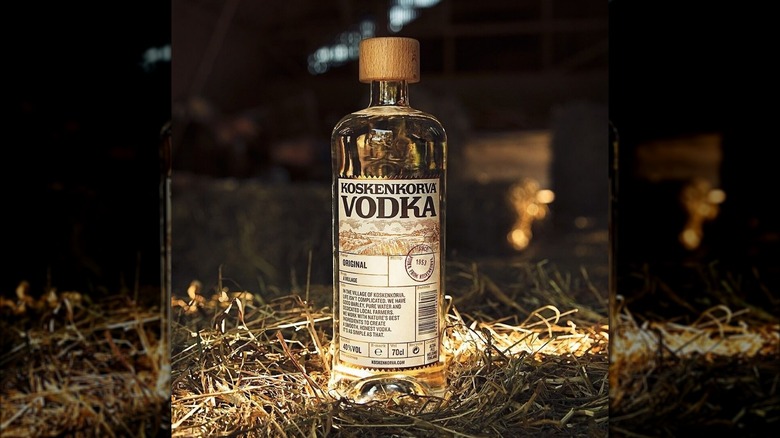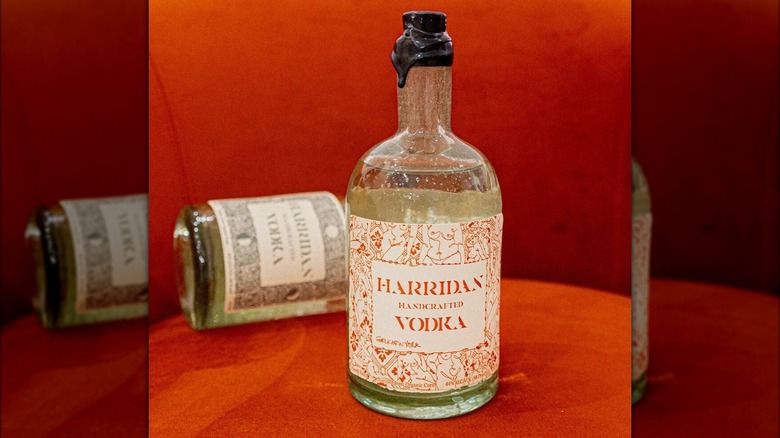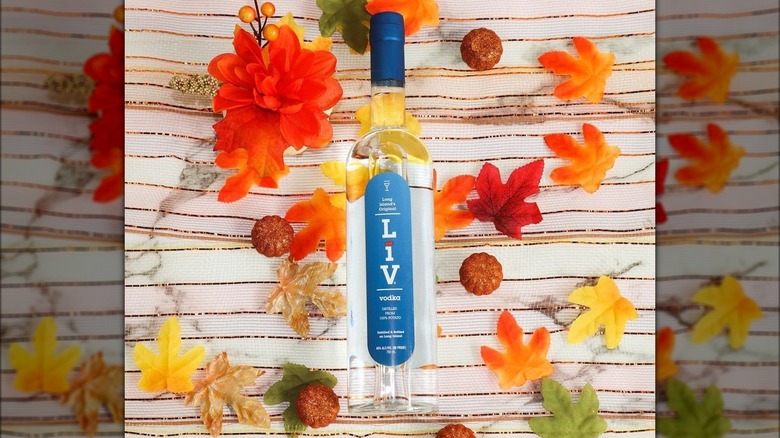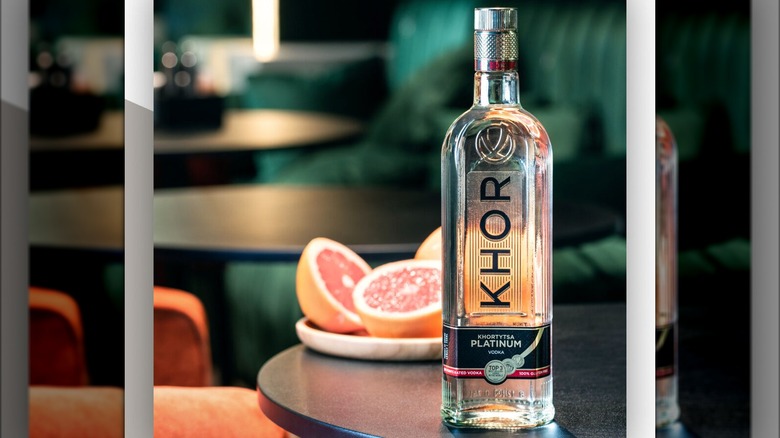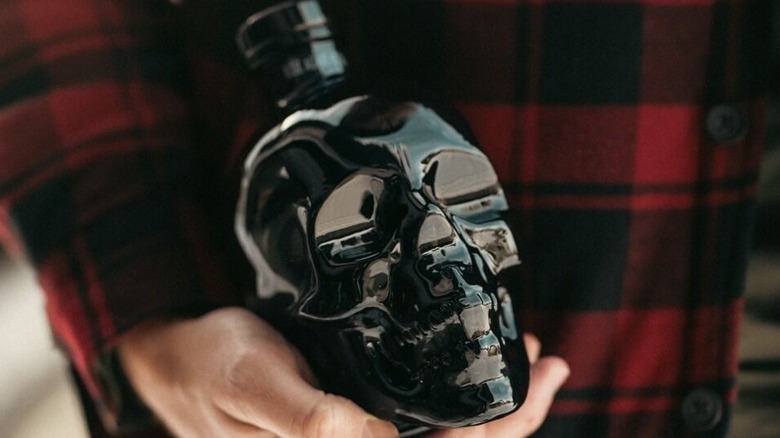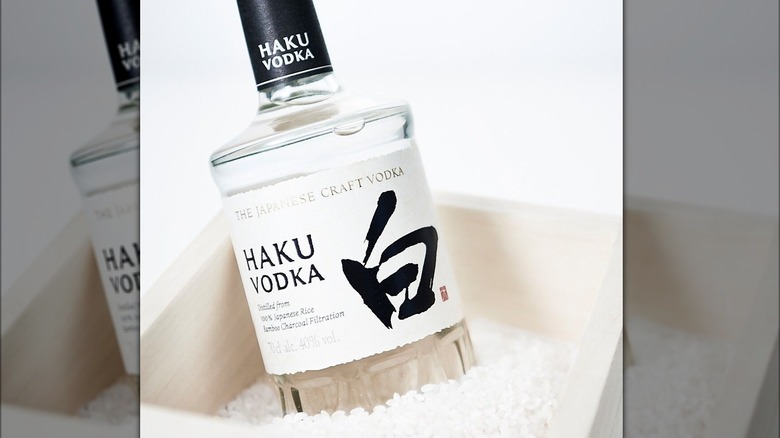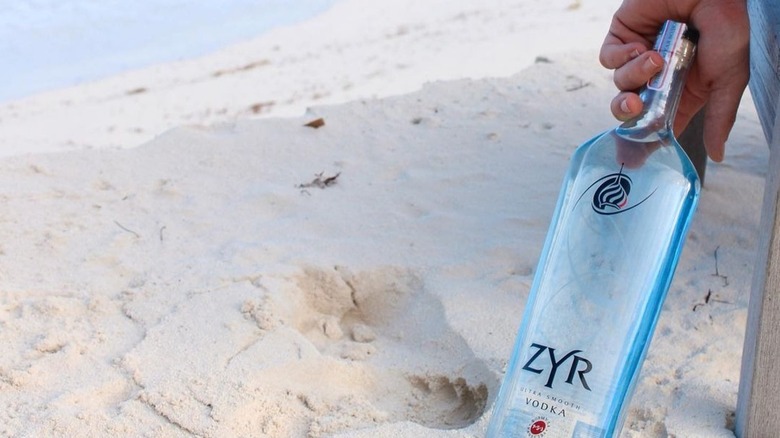15 Best Vodkas For An Espresso Martini
The espresso martini is definitely having a moment. It seems everywhere you look these days, whether it's a local restaurant, a high-end eatery, or a swanky bar, the dark, coffee cocktail is on the menu. It's become so popular in fact, that plenty of watering holes are starting to do their own riffs on the drink by switching out the vodka for other spirits like tequila or rum. There's even a strange viral trend occurring of adding (gasp) Parmesan cheese. If you want to enjoy the classic cocktail though, and aren't looking for anything unusual, vodka should always be the base spirit. But with so many different brands, which vodka will make the best espresso martini?
As with most cocktails, everyone has their own opinions about what works and what doesn't and it isn't any different with this drink. We spoke to a plethora of bartenders, event experts, and hospitality folks from around the country to find out which bottle they would reach for when shaking up this modern classic. We heard everything from the standards that we've been drinking for decades to newer brands we've never heard of. Read on to discover if you already have the best vodka sitting on your shelf or if you need to run out to your favorite liquor shop and buy a bottle.
Absolut Vanilia
Absolut is a tried and true vodka that you can find on most liquor store shelves across the country. It's the vodka that we chose when we first started drinking because it's so easy to find and has a nice price point, coming in at around $25. Absolut believes that all its ingredients from the water to the wheat should come from "one water source and one community" which is why everything that goes into the bottle is sourced from southern Sweden. That philosophy creates a vodka with a simple, clean flavor that's the perfect choice for many vodka drinks including the classic vodka cranberry.
But we're not the only ones who reach for it when we want a chilled shot or a vodka soda. Entertainment expert Paul Zahn thinks it's a great choice for the espresso martini as well. "You can never go wrong with Absolut Vodka," he says. "Absolut is the perfect mixable vodka that is accessibly priced. I always recommend using Absolut Vanilia [an] espresso martini," Zahn continues. "The vanilla flavor really adds a nice depth to this cocktail."
Grey Goose
If you peruse liquor menus like we do, then you've probably noticed that certain brands always seem to end up on the top shelf. These are the more expensive liquors that tend to taste better and so usually make for a better cocktail. Grey Goose is one such vodka. "It has a really smooth flavor and reads on a menu as elevated or premium," explains Andrea Boyd, the private dining manager and marketing director for the Wayfare Tavern in San Francisco.
One of the constant complaints that we hear about vodka is that it doesn't have any flavor. Grey Goose founders Sidney Frank and François Thibault wanted to change that and so created Grey Goose using only Picardie wheat from France. Then they make sure the vodka only goes through one distillation which allows the flavor of the wheat to shine. This flavor is exactly why Dante's beverage training director, Renato Marco Tonelli, thinks it's the best choice for an espresso martini. "Some vodkas can be a bit too bland," Tonelli explains. "Grey Goose has more character than many other vodkas on the market because it doesn't go through harsh filtration methods. That helps the drink retain a backbone and notes of the vodka while still letting the coffee be the star of the show."
Belvedere
Created in 1910, Belvedere is that crystal clear vodka in the tall frosted bottle that's impossible to miss. Available at most liquor shops and bars across the country, Belvedere is a great option that's not too expensive. Coming in at around $25, it's a vodka that several people in the liquor industry recommend for the espresso martini. Enesh Mantyyeva, co-owner of Russian Tea Time, tells us he likes it because "it's very smooth and balances out the taste of espresso in the cocktail." It's safe to say Mantyyeva knows a thing or two about vodka since they don't just serve the spirit in flights, shots, and cocktails at his restaurant — they'll teach you how to drink vodka "like a true Russian" as well.
But what's really unique about Belvedere isn't how the distillers draw upon 600 years' worth of vodka-making tradition. It's that the vodka comes from Polish rye, a grain that gives the vodka its unique flavor. That flavor is why Gary Wallach, a partner with Renwick Hospitality Group who is behind several New York restaurants known for their cocktails, often reaches for it when making an espresso martini. "It has zero additives, which results in a fantastically clear taste," he explains. "The subtle notes of almond and vanilla lend themselves perfectly to an espresso martini."
St. George All Purpose
Unlike other vodkas on this list, St. George makes several spirits. Best known for its gins, the distillery is based in Alameda, California, and makes everything from brandies to whiskeys. St. George vodka starts with a non-GMO grain base for its All Purpose Vodka, but the addition of pear brandy is what sets it apart.
Jörg Rupf, the founder of St. George, was impressed with all the amazing fruit surrounding him in the Bay Area and so chose to use it to create his eau de vie, or water of life, as the base for the spirit. Since Rupf's retirement in 2010, St. George's master distiller Lance Winters and head distiller Dave Smith have produced spirits in a variety of categories by using a range of fruits, vegetables, herbs, botanicals, and grains.
That eau de vie is why Romeo's beverage director and co-owner, Evan Hawkins, says the All Purpose Vodka is his first choice for an espresso martini. "St. George blends its pear brandy and a neutral grain spirit to make their all-purpose flavor, which I love," Hawkins says. "The taste blends nicely when paired with the coffee bitter of an espresso martini."
Tito's Handmade Vodka
If you've been to any sports bar or friend's home bar, odds are you've seen (and probably tasted) Tito's Handmade Vodka. Created in the early '90s by Bert "Tito" Beveridge, Tito's is well known for being gluten-free because it's made from corn. The vodka with the copper cap may be the most popular vodka on the market having sold over 11 million cases in 2022, according to Statista, but that wasn't always the case.
Born in Austin, Texas, Tito's started the way a lot of big brands do: with an idea. It took a few years of non-stop distilling and tasting until Tito eventually had a vodka he was proud of, and he certainly got there. Andrea Boyd tells us it's that "smooth, crisp, and clean flavor profile" that makes this vodka a great choice for the espresso martini. But if you want to take your cocktail even further, the private dining manager of San Francisco's Wayfare Tavern suggests creating your own coffee liquor by infusing the vodka with espresso grounds.
Ketel One
Copper pot stills are often used to make bourbon and whiskey, but several gin and vodka brands use them as well since they tend to produce a delicious spirit and don't need to be cleaned between distillations. One vodka that's been using the copper pot still since its inception in 1983 is Ketel One. In fact, that pot still is how the brand chose its name. The distillers used a Distilleerketel number one which just happens to be Dutch for Pot Still Number One and Ketel One was born.
It's fitting that number one is in the vodka's name because this spirit was the number one choice for two different industry insiders. Andrea Boyd tells us Ketel One's "smooth and clean taste" is why it's always her first choice for the espresso martini. "You really want your vodka to seamlessly blend in with the other flavors," she explains. "You don't want it to compete or overpower the cocktail."
Ketel One is also Kristie Sibley's usual go-to vodka. "It is crisp, clean, and smooth and embodies what a neutral spirit really is," the Senior Director of Food & Beverage of the Kennebunkport Resort Collection explains. "Espresso martinis should highlight the beauty and robust espresso as long as it's brewed fresh for the cocktail, and Ketel One lets that flavor shine."
Black Cow Vodka
We've enjoyed a lot of different liquors and cocktails over the years. So, we know that the distillation process for most liquors starts with fresh produce or grains. But we've never heard of a liquor starting with curds and whey. Well, that's exactly the base of Black Cow's velvety vodka.
It all started one day back in 2011 when good friends Paul 'Archie' Archard and Jason Barber were enjoying a drink together and came up with the idea of creating a pure milk vodka. Since Barber is a fifth-generation dairy farmer, getting the milk to make their vodka wasn't hard. (His dairy farm is just a few miles up the road.) But they don't use the milk to create their vodka — they use the leftover whey. How do you turn whey into vodka? They won't tell. But the end result is a vodka that's "so smooth you can drink it till the cows come home."
That smoothness is why Brynn Smith tends to use it when she shakes up an espresso martini at Bar Next Door in West Hollywood. She says she likes the "creamy mouthfeel" of the spirit, which leads to many great drinks — most notably the one we're focused on. "It's stellar in an espresso martini," she says.
Wodka Vodka
"We normally use WÓDKA Vodka, which is a Polish rye vodka," Reed Adelson, owner of Virginia's in New York City, tells us. The vodka, which really does come from Poland, is proud of the fact that everything about it is Polish from the rye which is locally grown in Dankowskie, to the charcoal used during the filtration process. Even the distillery is located in Poland.
Inside those Polish walls is where all the magic happens: the distillers mill, cook, and ferment the grain themselves. Then it's distilled five times and mellowed twice through a charcoal filter. A charcoal filter that's made from a special Polish birch tree. After all that work, both the distillers and the vodka rest. The final result is a vodka that tastes good mixed into a cocktail or on its own, and Adelson agrees. "We find it to be remarkably consistent and blends well with the other components of classic Espresso Martini cocktail builds," he says. "The key is for the vodka to be more or less neutral but also very smooth and consistent."
Koskenkorva Vodka
If you prefer your liquor bar to be full of sustainable spirits, then the Finnish Koskenkorva Vodka is the bottle for you. It's so green, in fact, that it was awarded Green Company of the Year in 2018. Koskenkorva focuses on sustainability in several ways, but it starts by making sure that the farmers and distillers use 100% of every barley grain that's locally sourced in and around the Koskenkorva distillery and estate. Using barley also allows the distillery to use less water to clean the grains before turning them into liquor.
But barley isn't the only way Koskenkorva works to decrease its carbon footprint. The water used in creating this spirit is made from pure spring water that's totally unfiltered and unprocessed. The water and barley combine in a continuous distillation process to create a vodka that isn't just one of Paul Zahn's favorites, he truly believes it's "perfect for drinks," especially an espresso martini. "Koskenkorva is a wonderful option for espresso martinis because it is so neutral and smooth," the entertainment expert says. "It will really make the coffee notes pop."
Harridan Vodka
"Strong" and "women" — two words that fit New York's Harridan Vodka perfectly. Created by Bridgette Taylor in 2020, this spirit is definitely on the stronger side, coming in at a noteworthy 44% alcohol by volume. All that is quite fitting considering the name of this vodka means "a bossy or belligerent woman." While that definition might be offensive to some, the women at Harridan couldn't be more proud. As a matter of fact, that definition is the first thing you see when you visit the website.
Distilled and bottled in upstate New York, this vodka uses organic corn and bottles that are hand-blown from recycled glass. Because the creators want the subtle sweetness of the corn to shine through, Harridan is only distilled twice. Other vodkas out there may distill four or five times, but the folks at Harridan are so confident in their product, that they don't feel multiple distillations are necessary. They believe that if they distill it anymore, they will lose the flavor that makes Harridan the award-winning spirit it is. That subtle sweetness is why Evan Hawkins tells us it's one of his "favorites" for the espresso martini. "Harridan Vodka is a local vodka made right here in New York, it's 88 proof but doesn't taste like it," explains Romeo's co-owner and beverage director. "It is made from corn so it has this creamier and slightly sweeter mouthfeel than most vodkas, which makes it the perfect use for an espresso martini."
LiV Potato Vodka
"When reaching for vodka, I often opt for non-grain-based varieties, and at The Wesley, the selection is effortlessly grain-free," explains Gabriel Maldonado, the restaurant's general manager. So, the vodka he chooses for an espresso martini is LiV Potato Vodka. "Hailing from a Long Island-based company led by Richard Stabile, this vodka adds a delightful texture, complementing the richness of both espresso and espresso liqueur," he says.
LiV Potato Vodka comes from Long Island Spirits, a distillery in the North Fork of Long Island surrounded by acres of potato, rye, and corn farms. But the company isn't just surrounded by farms, the distillery itself is housed in a barn that was once the base of a prolific potato farm. Even though Long Island Spirits has traded potatoes for vodka, it still uses all the produce surrounding it to create several spirits. There are three different kinds of vodka (including an espresso-flavored version made from locally grown espresso beans), a gin, a few liqueurs, and more than 10 different whiskies. While Long Island Spirits distills a wide variety of spirits, it has won its fair share of awards, including the Double Gold from the NY International Spirits Competition for its LiV Potato Vodka.
Kohr
Made in the Ukrainian city of Zaporozhe, Khor has the prestigious honor of being one of the top three best-selling vodkas worldwide for five years in a row. Like a few other vodkas on our list, Khor is also made using just corn and water, but it's the water that makes this vodka the stellar spirit it is.
While every vodka goes through a filtration system, each brand has its own unique way about it. Khor's filter isn't only organic, it contains schungite, a mineral native to Russia that allows Khor's vodkas to have a mouthfeel akin to natural spring waters. The distillery takes that filtration process even further by adding quartz sand and charcoal from birch and alder trees and then having the vodka go through seven rounds of filtration. All that work pays off, creating a vodka that Enesh Mantyyeva of Russian Tea Time says is great for our coffee-based tipple. "It is extremely smooth, doesn't overpower the taste of espresso, and doesn't burn your throat."
Crystal Head Onyx
Probably the most interesting-looking bottle on this list, the stunning black skull is another in the long line of celebrity-owned spirits. Crystal Head is the brainchild of Dan Aykroyd and John Alexander who designed the vodka and "bottle as a symbol of life, reflecting power and enlightenment."
But what makes the Onyx expression really unusual is that, unlike other vodkas that are made from corn, potatoes, or grains, Onyx is distilled from Blue Weber Agave, the plant usually reserved for tequila. The distillers take the agave and blend it with pure water from Newfoundland, Canada which creates a vodka that Paul Zahn says "has a semi-sweet finish — making it a great option for espresso martinis."
Each of the five Crystal Head bottles is as unusual as the vodka inside. The Onyx is jet black to match the onyx crystal for which the vodka is named. Black onyx is considered to be a powerful protection stone, with the ability to absorb negative energy while providing physical and emotional strength to whoever wears it. The bottle itself is such a statement piece, which can work even further to your advantage when hosting. "Another reason I love Crystal Head is you can batch up some espresso martinis before any event in the Crystal Head bottle and make hosting easy and create a fabulous centerpiece," Zahn says.
Haku Vodka
From the monolith spirit company, Suntory, comes Haku Vodka, the only Japanese vodka on our list and the only vodka made from rice, which is how the vodka got its name. Haku is the Japanese word for white, and Hakumai is the Japanese white rice that's used to create this spirit. But it doesn't stop there. The Japanese rice is fermented and distilled and then put through a filtration method that uses bamboo charcoal. This type of filtration goes back to ancient Japan when charcoal was believed to "'sweeten the water used to make tea."
It's for all these reasons that Evan Hawkins tells us it's one of his top choices for an espresso martini. "Like most things that come from Japan, this spirit is expertly made. It's made from rice and has this amazing starchy mouthfeel that's a little bit like sake," he says. "You can taste the rice through the vodka in a delightful way. This again provides such a nice flavor to your standard espresso martini."
Zyr Vodka
"For the espressotini it really comes down to what kind of vodka you like in general," explains Jeanine Silvani. As the general manager at the iconic Russian Tea Room in New York, Silvani knows a thing or two about vodka since she says they always have around 40 different vodkas on their menu at any given time. When it comes to the espresso martini, Silvani says she prefers a vodka that's "nice and smooth and doesn't have a lot of kick to it." So, her first choice, and one that she says they use frequently is Zyr Vodka. "It's excellent," she says emphatically. "It's nice, clean, smooth, crisp. So, you're not getting any kind of taste from the vodka. It's just got that very clear vodka flavor to it."
Creator David Katz did a lot of research to get that clear vodka flavor Silvani refers to. While living in Russia, the original home of Zyr, Katz visited several distilleries and learned and tasted all he could so he could create "the finest vodka in flavor, texture, and purity without cutting a corner." Silvani says that Zyr is often requested at the Russian Tea Room, so we'd say he's succeeded.
